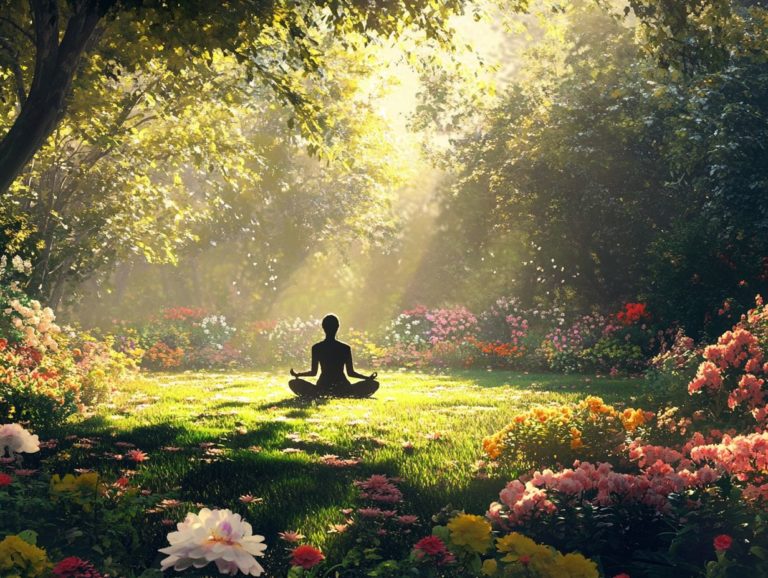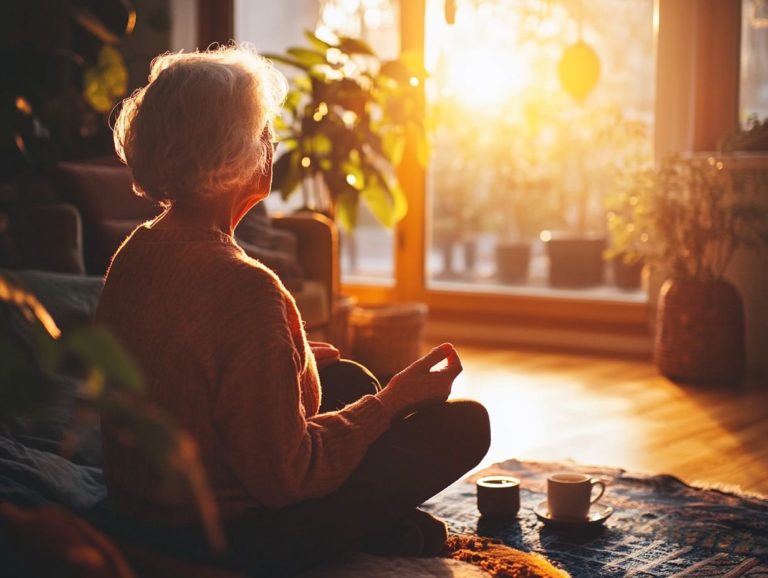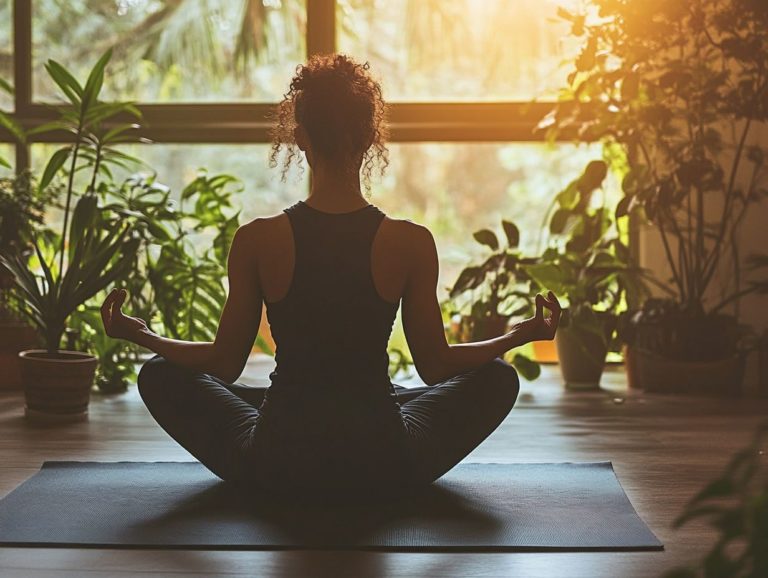5 Benefits of Aromatherapy for Relaxation
Aromatherapy has long been valued for its remarkable ability to soothe both mind and body, providing a natural avenue to relaxation through the use of various essential oils and herbal remedies.
In this article, you ll explore five key benefits of aromatherapy, including stress relief and anxiety reduction, to enhance your overall well-being. It delves into how aromatherapy works, the diverse types of therapeutic oils available, like lavender and chamomile, and the most effective ways to incorporate them into your relaxation routine.
You ll also find guidance on selecting the right oils, including massage oils and carrier oils, along with an examination of potential risks. Dive into the wonderful world of aromas and discover how these aromatic elixirs can elevate your relaxation experience to new heights!
Contents
- Key Takeaways:
- 1. Reduces Stress and Anxiety
- 2. Improves Sleep Quality
- 3. Boosts Mood and Energy
- 4. Relieves Headaches and Muscle Tension
- 5. Enhances Overall Well-Being
- How Does Aromatherapy Work?
- What Are the Different Types of Essential Oils Used in Aromatherapy?
- What Are the Different Ways to Use Aromatherapy for Relaxation?
- Are There Any Risks or Side Effects of Aromatherapy?
- Can Aromatherapy Be Used in Conjunction with Other Relaxation Techniques?
- What Are Some Tips for Choosing the Right Essential Oils for Relaxation?
- Frequently Asked Questions
- What is aromatherapy and how does it promote relaxation?
- What are the 5 benefits of aromatherapy for relaxation?
- How does aromatherapy improve sleep?
- Can aromatherapy help with reducing stress and anxiety?
- What kind of essential oils are best for promoting relaxation?
- Are there any potential side effects of using aromatherapy for relaxation?
Key Takeaways:

- Aromatherapy can help reduce stress-related issues and anxiety, promoting relaxation and a sense of calm.
- By improving sleep quality, aromatherapy can aid in achieving a more restful and rejuvenating night’s sleep through relaxation techniques.
- Using essential oils in aromatherapy can boost mood and energy levels, contributing to mood improvement and overall quality of life.
1. Reduces Stress and Anxiety
Aromatherapy has long been celebrated for its remarkable ability to help reduce stress and anxiety. It utilizes lavender oil and other plant extracts to create a calming effect that enhances mental health and overall well-being.
This holistic approach is gaining recognition among healthcare providers as a legitimate method for stress relief and anxiety management. By using techniques such as inhalation and topical application, you can unlock the benefits of these naturally derived oils.
For instance, both lavender and chamomile have been shown to gently soothe the nervous system, fostering a state of tranquility. Research indicates that inhaling lavender essential oil can significantly lower stress hormone levels, showcasing its effectiveness for stress relief.
Throughout history, various cultures have cherished aromatherapy. The ancient Egyptians employed it in embalming as part of their ancient medicine, while the Greeks and Romans wove it into their wellness practices. This rich tapestry of historical application highlights its lasting importance in promoting emotional wellness, making aromatherapy a lasting friend in your wellness journey.
2. Improves Sleep Quality
Using aromatherapy, especially with essential oils like lavender, can profoundly enhance your sleep quality and contribute to relaxation techniques. By creating a serene environment filled with calming scents like eucalyptus and chamomile, you cultivate relaxation that lulls you into a restful night.
When these oils are harnessed effectively, they can influence neurotransmitters chemicals that help transmit signals in the brain such as serotonin and dopamine, key players in achieving a truly restorative slumber. Exploring additional oils like chamomile and bergamot broadens your aromatic palette, providing a variety of relaxing scents to elevate your experience.
One effective method is to diffuse these oils in your bedroom before bed, allowing a gentle mist to envelop the space and prepare your mind for a tranquil night’s rest. You might also consider adding essential oils to a warm bath, blending them with carrier oils, or using them in pillow sprays. Both of these methods contribute to an atmosphere of calm that fosters deeper relaxation and rejuvenating sleep.
Start incorporating these oils today and feel the difference in your relaxation routine!
3. Boosts Mood and Energy
Aromatherapy is a great way to boost your mood and energy. It uses essential oils, such as bergamot, known for improving your mood.
These oils evoke positive emotions, enhancing your overall quality of life. Bergamot, along with lavender and peppermint, plays a vital role in managing stress and promoting emotional wellness.
Lavender oil is celebrated for its calming effects. It’s often used in evening routines to help you relax and improve your sleep quality.
Peppermint also wakes up your mind! It’s perfect for keeping your energy high during the day and aids in stress management.
By adding essential oils to your daily practices whether diffusing them during meditation or adding them to your bath you can create a serene atmosphere. Simple inhalation techniques, like taking a deep breath of the aroma directly from the bottle, can offer immediate stress relief.
Experience the amazing power of essential oils to rejuvenate your day!
4. Relieves Headaches and Muscle Tension
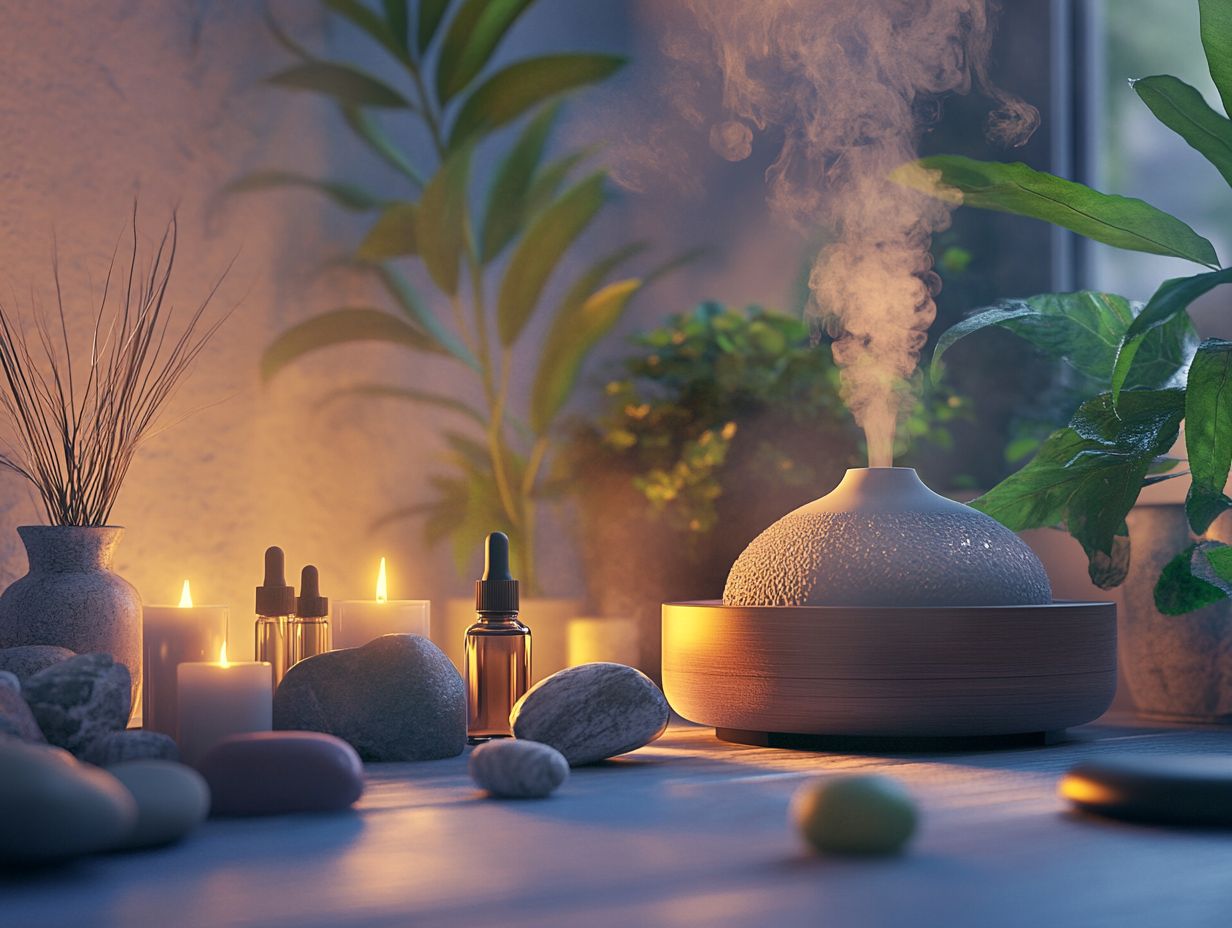
Through the artful use of essential oils in aromatherapy, you can find natural relief from body aches and muscle tension. This is a smart alternative to conventional pain management methods.
Some oils can reduce swelling and relieve pain. For example, lavender oil is not just famous for its calming aroma; it also helps ease muscle soreness.
Research shows that lavender can significantly reduce pain perception. Consider blending eucalyptus or lavender essential oils with a carrier oil for a soothing massage.
Alternatively, add a few drops to a diffuser while you relax at home. Regular use can create a calming space that supports your immune system.
5. Enhances Overall Well-Being
Aromatherapy is a holistic treatment option that boosts your overall well-being. It promotes emotional wellness and supports your immune system with various essential oils and plant extracts.
This practice shows how mental and physical health are interconnected. Achieving a balanced emotional state can lead to improved immune function and quality of life.
Essential oils like lavender are well-known for their calming properties, vital for stress management. They can help reduce anxiety and stress, which strengthens your immune system and enhances mental well-being.
Eucalyptus oil is another gem, providing respiratory support and promoting feelings of clarity and focus.
Incorporating essential oils into your daily routine can nurture both emotional stability and physical health. Don’t miss out on the chance to enhance your quality of life!
How Does Aromatherapy Work?
Aromatherapy operates by stimulating the scent receptors in your brain. This ignites emotional responses and influences brain chemicals that foster relaxation and well-being, all supported by scientific evidence showcasing its effectiveness across various health conditions.
Research reveals that essential oils, such as lavender and bergamot, engage your olfactory system. They prompt the release of brain chemicals like serotonin and dopamine, which are essential for mood improvement. This delightful interaction alleviates stress and anxiety while also lifting your mood and enhancing your overall emotional health. Additionally, incorporating nature walks can provide a natural alternative to conventional treatments.
For instance, a study published in the Journal of Alternative and Complementary Medicine indicates that inhaling lavender essential oil significantly reduces cortisol levels, the hormone most commonly linked to stress-related issues.
By grasping these intricate processes, you can harness the power of aromatherapy to cultivate a more tranquil and balanced lifestyle and enhance your overall mental well-being.
What Are the Different Types of Essential Oils Used in Aromatherapy?
The realm of aromatherapy is rich with a variety of essential oils, each boasting its own distinctive and medicinal qualities. Picture lavender, renowned for its relaxation properties; chamomile, a gentle ally in reducing anxiety; bergamot, your go-to for mood enhancement; and eucalyptus, a champion for respiratory benefits.
These oils do more than just enhance your emotional equilibrium; they also bolster your physical well-being. This makes them a versatile addition to your wellness routine and a vital component of functional medicine.
Imagine transforming your nightly routine with the soothing scent of lavender essential oil. A few drops in a diffuser or blended with a carrier oil for a calming massage can change your space into a serene haven that encourages restful sleep and enhances your sleep quality.
Consider chamomile, celebrated for its soothing effects and its role in promoting mental well-being. You can brew it as a tea or inhale its essence through steam to wash away the tension of a long day. Bergamot finds its place in uplifting blends that invigorate the senses, while eucalyptus can be added to a warm bath or inhaled in steam to effortlessly clear your airways and support your respiratory health. Additionally, incorporating the benefits of laughter for wellness can enhance your overall relaxation and well-being.
These examples illustrate just a few of the myriad ways these essential oils can enrich your everyday life and contribute to your overall well-being.
What Are the Different Ways to Use Aromatherapy for Relaxation?
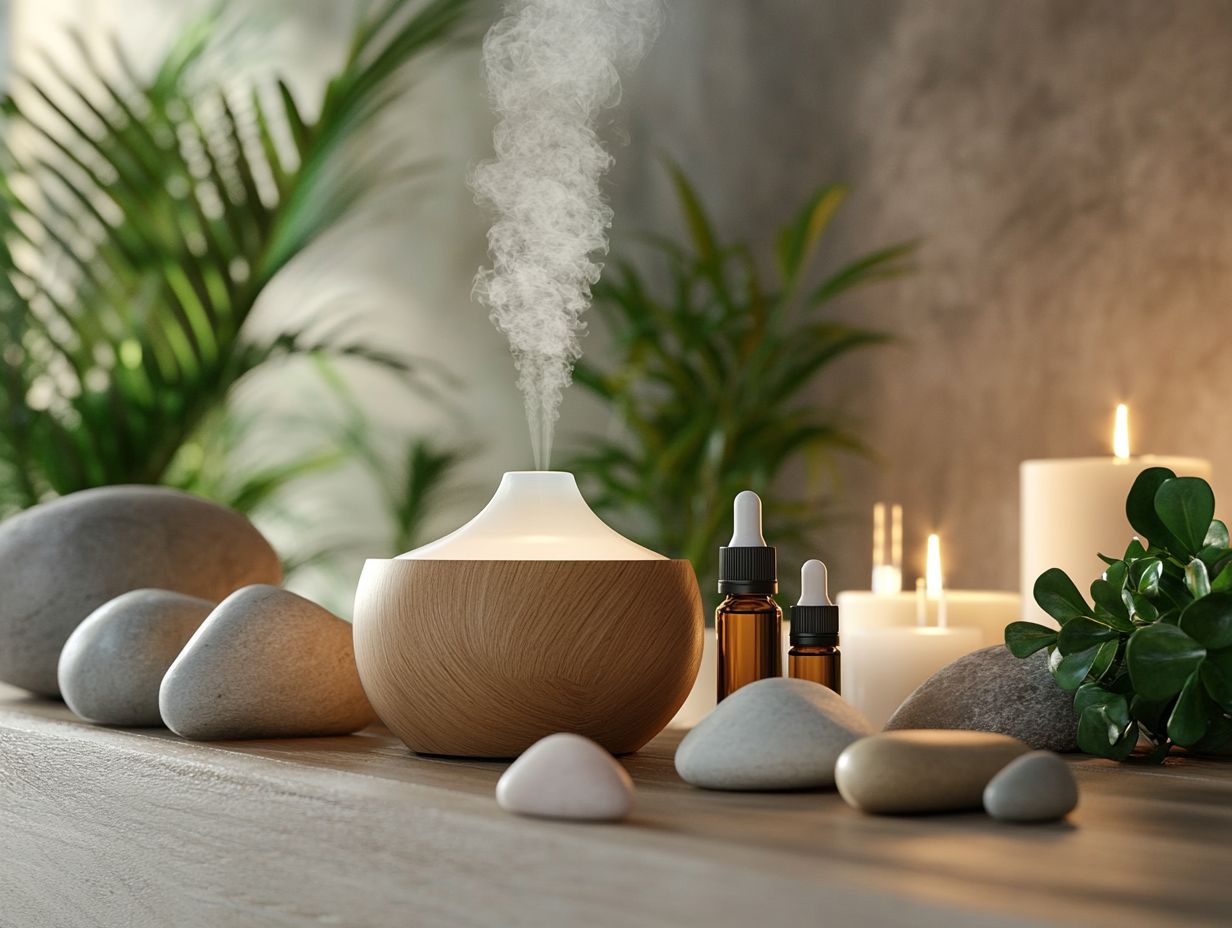
Aromatherapy presents a variety of methods for relaxation. From diffusing calming scents to applying oils through soothing massages and aromatherapy techniques, each approach leverages the remarkable power of essential oils to foster tranquility.
Incorporating these techniques into your daily routine can significantly elevate your sense of well-being and support your mental health. When you use a diffuser, think about blending complementary oils, like lavender and chamomile, to create a serene atmosphere that promotes emotional wellness. Additionally, consider the role of nature in relaxation methods; a dimly lit space, free from distractions, enhances those calming effects.
When applying oils topically, a gentle massage not only alleviates tension but also boosts circulation. Opt for warm, soothing oils during this process to make a world of difference. Inhalation techniques like breathing in essential oils directly from a bottle or using a personal inhaler can provide instant relaxation, especially when combined with deep, mindful breathing. Additionally, exploring the benefits of warm baths for relaxation can enhance your overall experience.
To amplify the experience, create a comfortable setting with soft textiles and calming music. This thoughtful environment enriches your aromatherapy journey, inviting deeper relaxation and peace into your life.
Start experimenting with essential oils today to discover your path to relaxation!
Are There Any Risks or Side Effects of Aromatherapy?
While aromatherapy can be a wonderful addition to your wellness routine, it’s essential to remain vigilant about the potential risks and side effects linked to certain essential oils. Consulting a healthcare provider before diving in is a wise step.
Some oils might trigger allergic reactions, skin irritation, or even respiratory issues if not used correctly. For instance, strong oils like cinnamon or clove need to be properly diluted with carrier oils oils used to dilute essential oils, such as coconut or jojoba to help mitigate any adverse effects. Try performing a patch test on a small area of skin prior to full application, especially if you have sensitive skin or pre-existing conditions like asthma or epilepsy.
If you re pregnant, nursing, or managing particular health issues, exercising extra caution is paramount. Following safe usage guidelines allows you to reap the rewards of these natural remedies without jeopardizing your well-being.
Can Aromatherapy Be Used in Conjunction with Other Relaxation Techniques?
Aromatherapy can be a powerful ally in your quest for relaxation, seamlessly enhancing other techniques to form a comprehensive approach to stress management and emotional wellness. It fits beautifully into a holistic treatment plan.
Incorporating essential oils like lavender or chamomile into your mindfulness practices can elevate the calming effects of breath awareness, helping you feel more grounded and at ease. Similarly, using invigorating aromas such as eucalyptus or peppermint during yoga sessions can awaken both your mind and body, enriching the entire experience. Additionally, you might consider simple stretching routines for relaxation to enhance your overall well-being.
As you engage in meditation, consider using aromatic diffusers filled with soothing fragrances like sandalwood or frankincense. This creates a serene atmosphere that fosters deeper focus and tranquility. Additionally, incorporating the benefits of laughter for relaxation can boost the advantages of each technique and cultivate a more enriching ritual for your emotional recovery and relaxation.
What Are Some Tips for Choosing the Right Essential Oils for Relaxation?
Choosing the right essential oils for relaxation is an art that involves understanding your personal preferences, the therapeutic benefits of the oils, and their overall quality all of which contribute to enhancing your quality of life.
Start by reflecting on your individual scent preferences, as everyone finds tranquility in different aromas be it soothing lavender, invigorating eucalyptus, or refreshing citrus. Next, consider how you plan to use the oils: are you seeking a calming massage, enhancing your meditation practice, or simply looking to freshen up your space? Incorporating practices like regular stretching can also enhance your overall wellness.
Always prioritize purity and quality by opting for high-quality oils, steering clear of synthetic additives that can compromise their effectiveness. Embrace a spirit of experimentation mix and match different oils to uncover unique combinations that resonate with your senses, ultimately crafting your personal sanctuary of relaxation.
Frequently Asked Questions
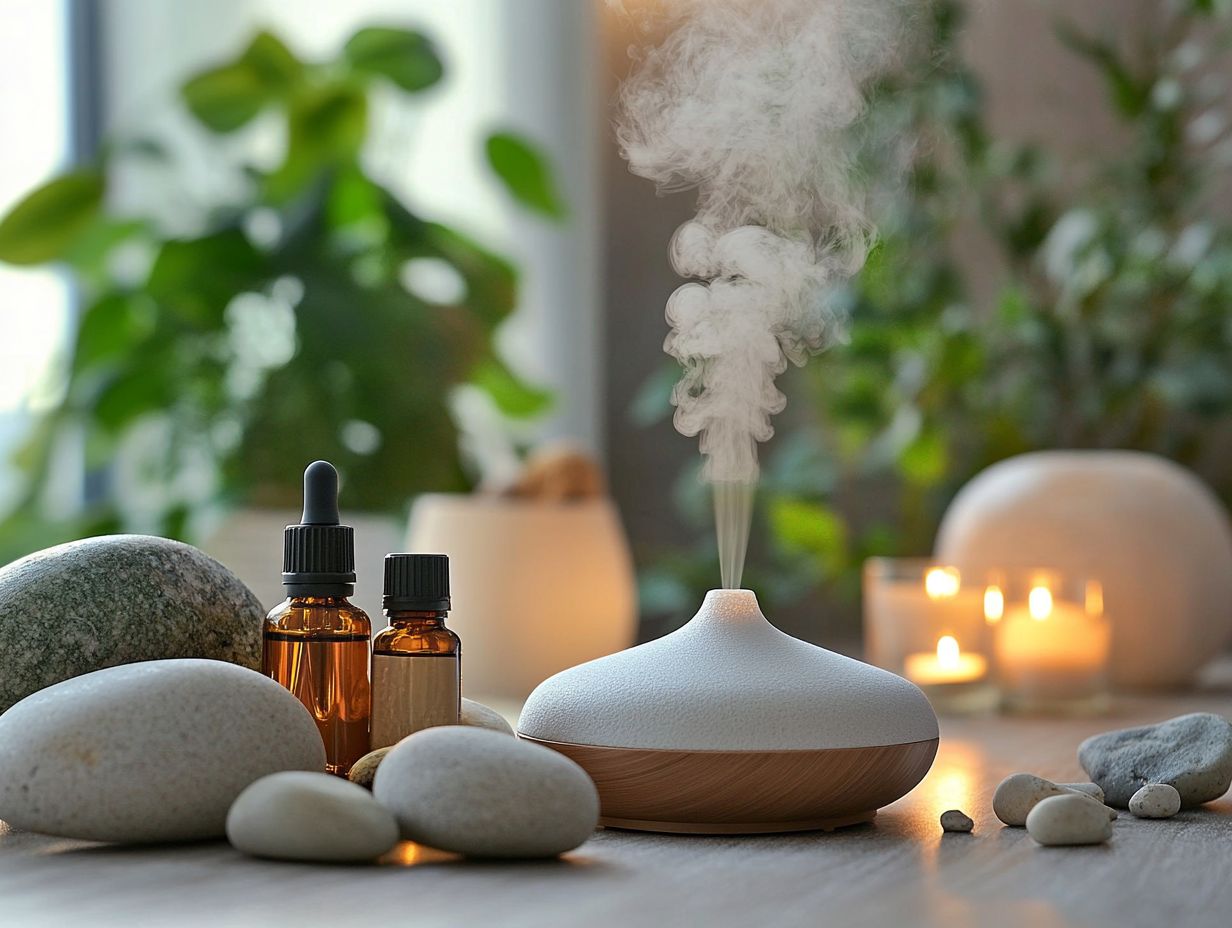
What is aromatherapy and how does it promote relaxation?
Aromatherapy is the use of essential oils and aromatic plant extracts to enhance physical and mental well-being. These oils are believed to have therapeutic properties that can help relax the mind and body.
What are the 5 benefits of aromatherapy for relaxation?
- Improved sleep
- Reduced stress and anxiety
- Enhanced mood
- Increased energy and focus
- Pain relief
How does aromatherapy improve sleep?
Aromatherapy promotes relaxation and helps calm the mind, making it easier to fall asleep and improve sleep quality. Certain essential oils, such as lavender and chamomile, have sedative properties that can aid in inducing sleep.
Can aromatherapy help with reducing stress and anxiety?
Yes, aromatherapy can be an effective tool in managing stress and anxiety. The scent of certain essential oils can help calm the nervous system and reduce feelings of stress and anxiety.
What kind of essential oils are best for promoting relaxation?
Lavender, chamomile, bergamot, ylang ylang, and clary sage are among the best essential oils for relaxation. They possess calming and soothing qualities that promote a sense of peace.
Are there any potential side effects of using aromatherapy for relaxation?
Aromatherapy can be a wonderful way to enhance relaxation! While it’s generally safe, using essential oils correctly and in moderation is essential.
Some individuals might face allergic reactions or skin irritation from specific oils. Always consult a healthcare professional before diving into aromatherapy, especially if you have health concerns or are pregnant.


